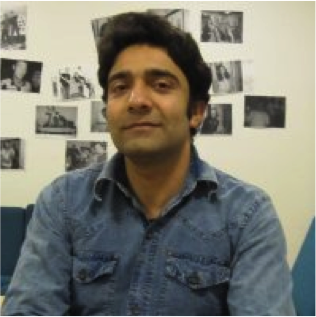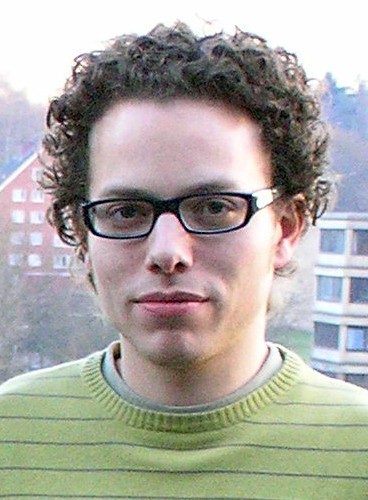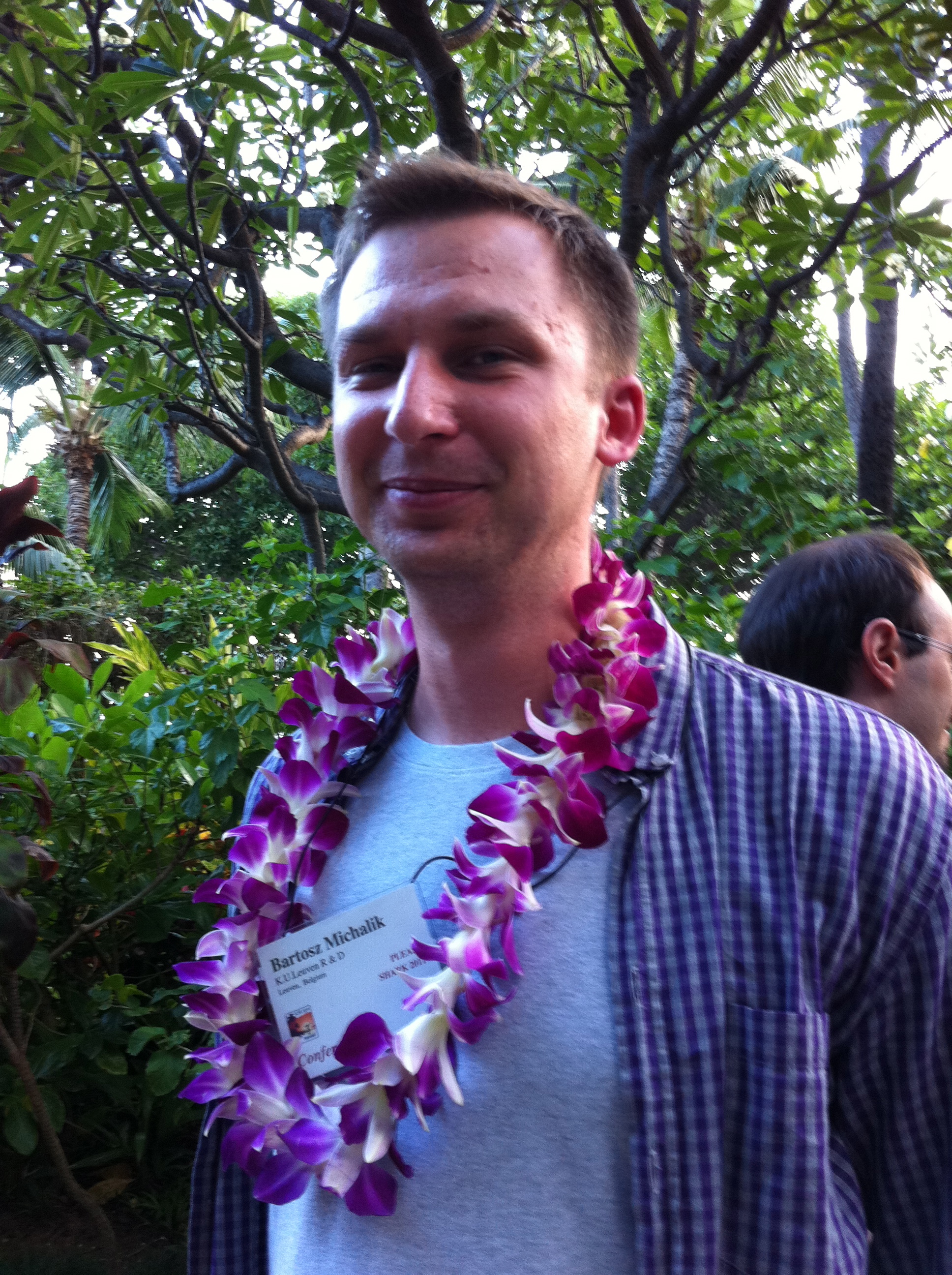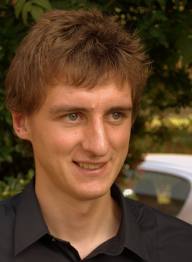Current Ph.D Students

|
Stepan Shevtsov started his PhD in 2014 in the AdaptWise research group. One key challenge
in the field of self-adaptive systems is to provide evidence to assure the required
quality properties during system opertation. To tackle this challenge, Stepan studies an
approach that combines formal modelling and verification with online learning.
He take an architecture-centric perspective on self-adaptation, which provides the right
level of abstraction to manage complexity and the required generality of solutions.
To design feedback loops, he employs principles from control theory, which provide a
mathematical basis for analysing key properties of self-adaptation,
incl. stability and transient behaviour. Online learning provides
the means to enable the self-adaptive system to acquire knowledge about design time
uncertainties during system operation. E.g., the system learns over time the reliability
of a set of services, which enables better service selection. The research results
will be validated in one of the domains of that are studied in the ongoing research
projects of the research group.
|

|
Sara Mahdavi-Hezavehi started her Ph.D in 2014 as a joint study at Linnaeus University and Groningen University.
Sara studies a systematic approach for self-adaption of multiple concerns at runtime. The research is driven
by requirements in the domain of healthy ageing and smart home services for elderly people, such as fall detection
and services to enable old adults and caregivers to interact. The particular fucus will be on two main concerns in
this domain: robustness and openness of systems. We study for example: openness for dynamic service selection and
integration of new services, and robustness of solutions when the technology is scaled up. To accomplish the research
goals, Sara will: a) study and develop models that capture the required knowledge of these concerns, and b)
investigate how these models can be employed at runtime to support tradeoff analysis and conflict resolution.
I supervise Sara's research together with
Paris Avgeriou.
|

|
M. Usman Iftakhir started his Ph.D in 2012 at Linnaeus University.
His research is situated in the field of self-adaptative systems. Self-adaptation endows a system
with the capability to adapt itself autonomously to changes in its environment and user requirements
in order to achieve particular quality objectives. A key challenges in self-adaptation is to handle
design time uncertainties such as evolving user needs and changing operating conditions.
The goal of Usman's research is to study and develop an formally founded approach to guarantee
the required quality properties in self-adaptive systems in the face of uncertainty.
This approach integrates verification of the behavior of self-adaptive systems during
architectural design with runtime exploitation of the formally verified models after deployment.
The research will mainly focus on robustness and openness requirements, and will be
applied to, and empirically validated in, the domain or multi-robot systems.
|

|
Didac Gil de la Iglesia started his Ph.D in 2008 at Linnaeus University.
In his research, Didac is developing systematic support for engineering self-adaptive systems.
His research focusses on consolidating design expertise in the form of patterns for so
called MAPE-K feedback loops (Monito-Analyze-Plan-Execute + Knowledge).
The patterns, which comprise reusable behavioral models and specification properties,
are formally specified, supporting rigorous modeling and formal verification at design time.
Didac derived the patters from applications in different domains, including multi-robotic
systems and mobile learning. In mobile learning, pupils use mobile devices with GPS support
to do outdoor learning activities (e.g., learn about geometric figures).
A particular challenge in this domain is the uncertainty of the
operating environment, e.g., degrading quality of a GPS signal. The patterns
have been validated in a series of case studies. These studies demonstrate that the patterns
provide reusable building blocks that can support designers of self-adaptive systems for a
family of self-adaptive systems.
|
Past Ph.D Students

|
Robrecht Haesevoets worked between 2006 and 2012 on his Ph.D at the Katholieke Universiteit Leuven.
In his research, Robrecht tackled a number of complex engineering problems related to the integration
and collaboration of informations systems used both within and across companies borders.
State of practice in this area relies on middleware, workflow management, service-oriented architecture (SOA),
and Web services. However, these approaches lack proper support for
modularization of complex collaborations, and separation of concerns
(e.g. collaboration functionality versus collaboration management).
To tackle these problems, Robrecht propsosed an approach called Macodo
(Middelware architecture for context driven dynamic organzations). Macodo consists of three complementary parts:
(1) a set of modeling abstractions for dynamic collaborations,
(2) a set of specialized architectural views to build and document software architectures,
based on these abstractions,
and (3) a middleware infrastructure that supports these abstractions as first-class programming abstractions.
Macodo focusses on a particular class of collaborations between Web services that take place in a
restricted collaboration environment, managed by a trusted party. The research results have been published ACM Transactions
on Software Engineering and Methodology (TOSEM). I have supervised Robrecht together with
Tom Holvoet.
|

|
Bartosz Michalik started his Ph.D in 2006 at Poznan University of Technology, Poland. In the first years,
Bartosz worked on a method to transfer knowledge regarding the Architecture Tradeoff Analysis Method (ATAM)
to industry people. In 2010, Bartosz joined DistriNet Labs at the Katholieke University in Leuven. Driven by
his experiences in a research project in collaboration with Egemin, a industrial producer of logistic systems,
his research focus shifted to the problems of online updates of deployed software product line products.
Logistic software systems are expected to be available 24/7. Updating such software systems with minimal
interruption of services is a challenging task, in particularly when accurate architectural
knowledge about the deployed software system is lacking.
To address this problem, Bartosz proposed an architecture-centric approach that comprises two complementary
parts: an update viewpoint and a supporting tool. The viewpoint defines the conventions for the construction
and use of architectural views to deal with the stakeholders' update concerns, in particular correctness and
availability. The supporting tool assists integrators with reconstructing missing architecture knowledge
using data harvested from the deployed resources, and guiding them with performing the updates.
An emperical experiment with professionals demonstrated that the architecture-centric
approach significantly improves the correctness of updates and reduces the interruption of services
during updates. Bartosz provided a formal description of the central algorithms of the proposed approach
and proved correctness and minimal interruption of service. His research results were published at WICSA 2011 and
ESEM 2011. A related survey on variability was published in IEEE Transactions on Software Engineering (TSE).
Bartosz was awarded a Ph.D for his research in 2012.
|

|
Nelis Boucke worked on his Ph.D from 2004 to 2009 at the Katholieke Universiteit Leuven.
In his research, he studied architecture views and relations between views.
In an emperical study, Nelis showed that the lack of rigorously speci!ed
dependencies among architectural models and support for automated composition of models are primary
causes of consistency problems in software architecture. To tackle these problems, he introduced an
approach in which compositions of models, together with their relations, are explicitly supported
in an architecture description language and demonstrated its value by comparing the original and
revised architectural descriptions used in the empirical study.
The research results are published in the Journal on Systems and Software (JSS 2010).
The research results of his work on relations between views have contributed to the conceptual model
of the Software Architecture Standard, ISO 42010, in particular the notion of model correspondences.
After his Ph.D Nelis co-founded
ArchiWise together with Alexander Helleboogh.
I served as counselor of Nelis Ph.D research with
Tom Holvoet as supervisor.
|
Future Ph.D Students
My research plans for the following years include the study and development of a scientific foundation for
engineering decentralized self-adaptive systems. The particular focus will be on robustness and openness
as key qualities. We use smart homes and multi-robotic systems as application domains to steer the fundamental research.
Central to our research are the use of formal methods to provide guarantees about system requirements and
empirical experiments to validate the research results.
For background information, I refer to my recent research publications on self-adaptation.
Keywords relevant for this research are: software architecture, self-adaptation, decentral control,
coordination mechanisms, formal modeling and verification, multi-robotic systems, empirial validation.
If you have a strong interest in doing research in this area, and if you are a committed person who is eager
to learn and work in team with motivated researchers, you may be a good candidate to start a Ph.D
in my team. You can send me an email with a motivation letter. In this letter you have to convince
me that you are an excellent candidate to work in my team.
General letters are discarded without further response.
|






